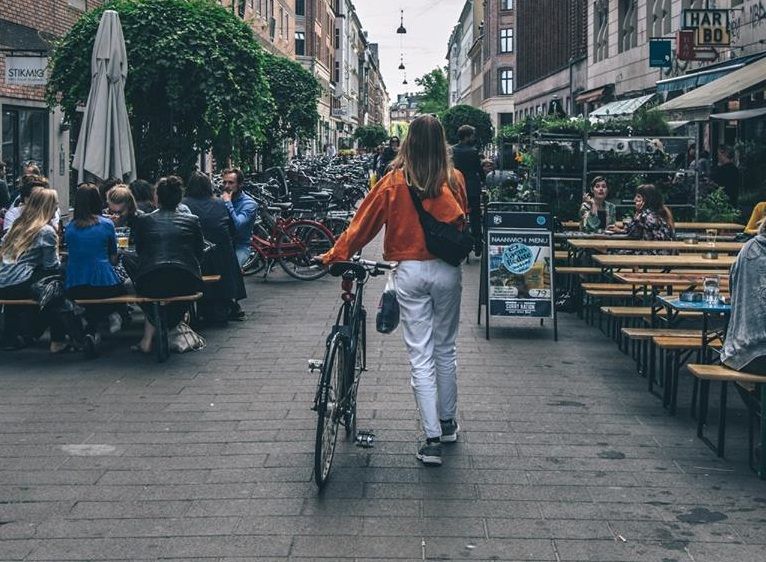Fair question! Danish politics can seem confusing at first—why is the party called Venstre (literally translated as “Left”) actually on the center-right? Why does Radical Left sound like a punk band but turn out to be a center-left political party? It’s confusing, sure, but you’ll get the hang of it. Once you dive in, you’ll find that there are practical, meaningful ways to get involved and make a difference. Here’s where I started:
Volunteer
Don’t let your Danish skills (or lack thereof) hold you back. Let’s take volunteering in a political party as an example. Yes, some tasks require fluent Danish, but there’s plenty you can do without being a language pro. And even if the Danish level seems high, see it as a challenge to confront. By exposing yourself to Danish as much as possible, you’ll pick up phrases and learn faster.
Political campaigns are always looking for extra help—whether it’s hanging up posters, passing out flyers, or using your skills in photography or video production. Approach a candidate you like and offer your help. They’ll be glad!
Once you know which party you want to support, finding a candidate is just a matter of reaching out. The distance between politicians, candidates, and the population is very small. Contact them, find the local chapter of the party, send an email, and ask if you can help one of their candidates—they’ll connect you.
Getting involved gives you a behind-the-scenes look at what issues are currently top of mind. It gives you the chance to talk to a candidate and see how the political system in Denmark works. And of course, you can share your story as an expat. Having a person connected to an issue makes it more memorable for the politician. Plus, campaign season has this team-sport energy. You’ll feel part of something bigger and bond with others in a unique way.
You can also volunteer in other organizations. Being engaged in society will give you a bigger stake in the community, and every single international volunteer shows that we (internationals) also care about Denmark.
Connect with Other Internationals
Talking about current affairs and politics with fellow expats can feel like group therapy. Venting about the struggles of bureaucracy, finding common ground, and sharing knowledge are huge elements of our community.
Join expat organizations like INDE or informal groups where you can brainstorm ways to bring issues to the forefront. Denmark’s welfare state relies on skilled workers, and let’s face it, internationals are seen as a solution to fill many of those gaps. Our voices aren’t just relevant—they’re essential.
Stay Informed
I won’t sugarcoat it: If you’re new to Denmark, the Danish media can feel like a maze of unfamiliar words and references. But staying informed is crucial. If your Danish isn’t strong yet, English-language outlets like this one or tools like Google Translate can be lifesavers.
You don’t need to become a political scholar, but knowing local and national news gives you the context to engage. Plus, you might spot trends you recognize from your home country, giving you an advantage in understanding where things might be heading.
Post on Social Media
Share your opinion on platforms like Facebook. It’s huge in Denmark, and Danes are much more active on it than people in most other countries.
Beware: Don’t just rant. Instead, share your thoughts—whether about who you’re voting for or reminding others to vote. There are lots of local groups, as well as groups dedicated to expats and different issues. Many internationals have primarily expat friends, so sharing and starting conversations is valuable and can spark action.
Vote, Vote, Vote!
Here’s the big one: vote. If you’re an EU citizen, you can vote in local, regional, and EU elections. If you’re from outside the EU, you can still vote in municipal elections after permanently living in Denmark for four years.
These elections are important. Municipalities have significant decision-making power over schools, parks, language programs, and even Jobcenters. Regional governments handle hospitals, and the EU shapes policies that affect everything from consumer rights to climate standards.
Think of voting as the easiest way to make your voice heard. You don’t need to be an activist—just someone who shows up on election day. For millions of people around the world, this right doesn’t exist. Here, it does. Let’s use it.
Get Started Now
Getting involved in Danish society and politics doesn’t mean you need to be fluent in Danish. Yes, it helps, but it can also help you improve your Danish. It’s about taking small, consistent steps: volunteering, connecting with others (online or in person), staying informed, and most importantly, voting.
These actions may seem small on their own, but together, they add up to real change. That’s how I started.



